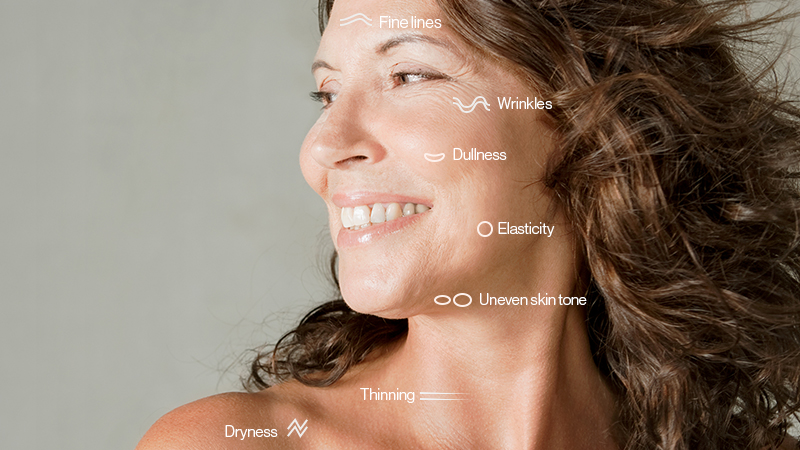SAD and the seven signs of ageing

At Advanced Nutrition Programme™, we refer to an imbalanced gut microbiome as a S-A-D gut. This is because the contributing factors all start with the letters S-A-D. These factors include stress, smoking, sleep problems, alcohol, ageing, antibiotics, and diet. Each one of them can lead to an imbalanced gut microbiome, which can cause some of the seven signs of ageing to appear on our skin. What are the seven signs of ageing? Our research team explain how each one of the S-A-D factors can impact the skin and share tips to help manage these factors for youthful, vibrant skin.
The seven signs of ageing
- Fine lines
- Wrinkles
- Elasticity
- Thinning
- Uneven skin tone
- Dullness
- Dryness
While all of us age in different ways, recognising S-A-D factors can help maintain youthful-looking, radiant skin.
Stress
The increased levels of cortisol can lead to stress showing up on your skin with inflammation and free radical damage causing fine lines to appear ¹. Chronic stress also decreases collagen formation and increases inflammaging (inflammation resulting in ageing). A healthy way to manage stress is by practicing meditation, yoga, exercising or dedicating time to do the things you enjoy such as spending time with friends and family.
Smoking
Many chemicals present in damage collagen and elastin. Smoking also restricts healthy nutrients reaching the skin which can cause dull, grey, lacklustre skin tone. The chemicals also trigger molecular events that can damage structures that are needed for skin elasticity. Inhaling the smoke may also dry and damage the surface of the skin ². These are just some of the negative affects to the skin from smoking. If you’re a frequent smoker, you should think about slowly starting to reduce your intake with the aim to give up completely. Check the resources online to help support you with this. The NHS provide many support options that help with quitting smoking.
Sleep problems
When you sleep, this is the time for your body to repair itself. This is especially true for your skin. When you sleep, your skin’s blood flow increases, rebuilds its collagen and repairs damage from UV exposure, reducing wrinkles and age spots. Research shows that just one night of poor sleep can cause darker under eye circles, swollen eye lids, more fine lines and wrinkles and paler skin ³. You should aim to get the recommend 7-9 hours of sleep a night to ensure your body and skin are getting enough sleep to recover. Avoid blue light from devices before bedtime to help prepare for sleep.
Alcohol
Drinking alcohol excessively causes dehydration. This can lead to your skin starting to sag and even lose its luminosity. As alcohol depletes your nutrients, hydration, and vitamin A levels, all of which have a direct impact on your skin and cause lines and wrinkles ². Consider how much alcohol you drink on a weekly basis and reduce your intake to 2-3 glasses and see some of the benefits to your skin. You may start to notice your skin has more of an even skin tone and more of a glow. Remember, moderation is key, so challenge yourself to enjoy alcohol free weeks or weekends.
Ageing
Ageing – unfortunately is out of our control. As we increase in age, our bodies internal processes including cell turnover slow down and take longer to complete. This is when wrinkles, fine lines can start to appear ⁵ . We can’t prevent ageing, but there are things we can do to prevent premature ageing, which manifest as lines and wrinkles, sagging, and sunspots. Our skin researchers recommend the following to help with premature ageing:
- Eat a healthy and balanced diet
- Wear an SPF daily
- Moisturise daily
- Stick to a regular sleep schedule
- Drink more water to prevent dehydration
Antibiotics
Antibiotics can be used to treat certain infections. However, what we may not know is antibiotics can also kill some of the good bacteria found in our gut. Although this process itself doesn’t contribute to ageing, it can cause our gut to have too much unfriendly bacteria, which can lead to inflammation in the gut. As a result, this may cause the inflammation to show on the skin ⁶. After you’ve taken a course of antibiotics, consider consuming some fermented foods including sauerkraut, miso, kimchi, tempeh to add some friendly bacteria to your microbiome.
Diet
Eating a healthy, balanced diet is key for skin health and healthy ageing. A high sugar diet rich in chocolate, sweets, and fast-food feed the unfriendly bacteria in our microbiome. In addition, diets lacking in fibre starve the good bacteria in the gut microbiome. Foods high in fibre include legumes, beans, peas, asparagus, and berries. You should ensure you consume a healthy diet with a variety of vitamins and minerals. In addition. avoiding high sugar foods and reducing alcohol intake can all help keep the unfriendly bacteria at bay. When looking to support your skin and prevent signs of ageing showing on your skin, consider your diet and ensure you’re eating a variety of vitamins and minerals, manage your stress levels, reduce smoking and alcohol intake. These can all have positive impacts on your skin and prevent S-A-D factors accelerating. Remember a happier gut = happier skin.
1. Brain-Skin Connection: Stress, Inflammation and Skin Aging. National Library of Medicine. June 2014.
2. Impact of smoking and alcohol use on facial ageing in women. National Library of Medicine. August 12, 2019.
3. Cues of fatigue: effects on sleep deprivation on facial appearance. Oxford Academic. September 2013.
4. Vitamin A and skin health. Micronutrient Information Centre.
5. Skin disorders in elderly subjects. National Library of Medicine. September 2015.
6. Unraveling the collateral damage of antibiotics on gut bacteria. October 2021.
